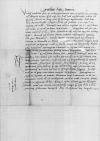Letter #4853
Cornelis DE SCHEPPER to [Ioannes DANTISCUS?]Regensburg, 1532-08-08
English register:
The original of this letter is lost – only a contemporary excerpt, sent by Dantiscus to Prussian Duke Albrecht von Hohenzollern, is preserved.
De Schepper describes the unexpected support he has been able to obtain from the German towns, especially Nuremberg, Ulm and Augsburg, for the military enterprises of the Emperor [Charles V].
The Turkish threat in the Danube region seems to be decreasing: they have turned back to Styria. The Turkish navy lies before Methoni, the imperial navy in nearby Sicily. The Turks will avoid a confrontation at sea; the imperial forces should be aware of the possibility of Turkish actions on land.
De Schepper boasts about the fighting spirit of the German soldiers, their support for the cause of the Emperor and the military equipment at the disposal of the imperial army.
The Lutherans and other Protestants are regaining their senses. The Lutherans are meeting with the Zwinglians about theological issues. At the moment, the imperial retinue is fully engaged in preparations for war, but when the Emperor renounces a confrontation with the Turks, the fleet can be used for a crossing to Naples, to spend the winter there.
Manuscript sources:
Prints:
| ||||||
Text & apparatus & commentary Plain text Text & commentary Text & apparatus
Numquam credebam fore, ut urbes Germanicae tam se exhiberent paratas ad obsequia
Quod ad
Non credidissem tam feracem esse militis
Ex
[1 ] The debate de signo et signato about the presence of Christ in the Eucharist remained a major controversy between the different tendencies within the Reformation (cf. Christoph Lüthy, David Gorlaeus (1591-1612): An Enigmatic Figure in the History of Philosophy and Science, Amsterdam, 2012 ⌊LÜTHYcf. Christoph Lüthy, David Gorlaeus (1591-1612): An Enigmatic Figure in the History of Philosophy and Science, Amsterdam, 2012 ⌋, p. 86-94)
